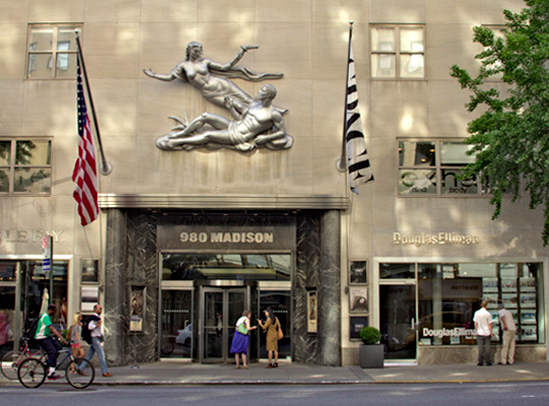
Marilyn Monroe, Thomas Jefferson Among Sandy Refugees: Manuscript Show Moves Uptown After Fraunces Tavern Flood
What does a dispossessed Cherokee tribe, a John Lennon-Eric Clapton supergroup and Marilyn Monroe’s unborn son have in common? All were shopping for an apartment on the Upper East Side on Monday afternoon.
Well, not exactly, but it is possible to shop for both a $4 million apartment and a $40,000 manuscript at the Douglas Elliman showroom at 980 Madison Avenue through Sunday.
Profiles in History, a middlebrow auction house (Albert Einstein’s letter’s, the desk Bram Stoker wrote Dracula on, Kate Winslett’s emerald earrings from Titanic) and Marsha Malinowski, who once auctioned off a Magna Carta for $21 million, are offering some 299 items on December 18, “the Property of a Distinguished American Private Collector.” Ms. Malinowski, after 26 years at Sotheby’s, struck out in May on her own, and her first big offering is the work of the collector she has long known.
After partnering with Profiles in History for the auction, Ms. Malinowski had planned on exhibiting a selection of the offerings at Fraunces Tavern downtown. After all, what more fitting a locale for a snarky letter from George Washington to Thomas Paine—he did not think much of Rights of Man, some 50 copies of which Paine had delivered to the president—or Thomas Jefferson begging Georgia to respect The Conistitution as “the law and the life” of the land and not push out the Cherokee. There is also a very lovely John Hancock. The letter is not much, but oh, that signature.
And it will only set you back $12,000 to $15,000. The Washington is $80,000 to $120,000, the Jefferson is $200,000 to $300,000. “The emotion, the beauty and the historical significance of the language makes it more and more valuable,” Ms. Malinowski said. A perfunctory Washington letter was in the same display case, asking but $30,000 to $50,000, its great virtue a Valley Forge dateline. “That adds insta-value,” Ms. Malinowski explained.
But this flood of parchment was preceded by a flood of water. As any history buff must know, Fraunces Tavern once bordered the city’s waterfront until all that great landfill was built out, and for a brief night in late October, it was so again. Sandy filled the historic inn with turbid water, and while the second floor galleries remained dry, the mechanicals in the basement were knocked out. The tavern promised it would be open on time, and it would have been, had the electrical repairs not passed muster with Con Ed. (Those guys, again!)
Somebody knew somebody who suggested Douglas Elliman’s space on Park Avenue. The august brokerage has called a space at 980 Madison home for decades, but last year, Dottie Herman, the firm’s president, made it over into a sort of salon, cutting down on agents and investing in big screen T.V.s, slick infographics and Saarinnen coffee tables. It is meant to be more apartment gallery than sales office—an appropriate enough setting given the presence of Gagosian and others upstairs in the Park Bernet building.
“We were doing a lot of work with Sandy, so this just fits,” Ms. Herman said, standing inside her flagship on four-inch heels. “We were very involved from the very beginning, pitching in, making donations. One guy was donating helicopters, I was involved in a lot of things, so it came through that they couldn’t open the show, so I said let’s do it here.” She also hosted an art show over the summer here, Study in Meditation, by Carrie Sunday.
People seemed more interested in gawking at the apartment printouts in the windows than the historical scribblings in the cases, but Ms. Malinowski was fine with that. “It’s not like buying art or real estate, it’s more intellectual, more cerebral,” she said. “These collectors, it’s for them, they’re literature buffs or history buffs, they’re not trying to show off to others what floats their boat.”
But there are also some parallels between art and manuscripts. Monet writes his wife, complaining of depression and doubting his artistic abilities, an article valued at $6,000 to $8,000. Van Gogh pens an equally banal item to an ill friend, but it is seven months before his death, in a very short life. The letter is worth $200,000 to $300,000. “Monet lived a very long life, while Van Gogh died young, and he usually wrote on terrible paper, since he was saving every good scrap for his art,” Ms. Malinowski explained.
In one case, separate items from Adam Smith and Karl Marx seemed to be getting on remarkably well. In another, Joe DiMaggio, writing on Madison Hotel letterhead, apologizes to Marilyn Monroe for getting in a fight within weeks of meeting and starting their romance, while she pens a letter from the Waldorf=Astoria many years later to a neighbor, rambling on about depression, poetry and wanting children. The hand is barely legible, presumably under the influence. Nearby, Hemingway shares his thoughts on casting for the film version of For Whom the Bell Tolls—he was partial to Ingrid Bergman playing Maria, appreciating her non-Hollywood look—and John Lennon asks Eric Clapton to join him and Yoko in the Plastic Ono Band.
Ms. Malinowski’s favorite is a first edition of Darwin’s On the Origins of Species—not especially rare, except that this one also includes a list of plantings the famed naturalist wants for his own garden. “It shows both sides of the man,” she said. “That’s what I love about manuscripts, where they show you the other side of the person you didn’t get from the history books.”
